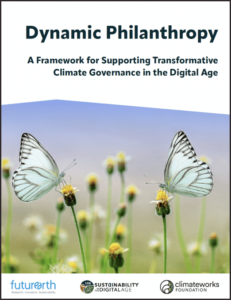Reimagining Climate Governance in the Digital Age
 In early 2021, Sustainability in the Digital Age, Future Earth, and ClimateWorks partnered together to explore the confluence of digital innovation and climate change. Recognizing the need and opportunity to leverage digital tools in a safe and inclusive way to accelerate climate action and ensure a thriving planet for all, we worked to develop guidance for philanthropic investments and to illustrate how philanthropy can support leveraging the digital sector to transform climate governance. We are excited to unveil the results of the Re-imagining Climate Governance in the Digital Age project in this report, Strategic Framework for Philanthropic Interventions in the Digital Age, and to share the database and framework that will help increase awareness of this work and develop innovative, inclusive, and transformative climate solutions in the digital age. You can read more about the launch of this project and its background in our previous blog post on the subject.
In early 2021, Sustainability in the Digital Age, Future Earth, and ClimateWorks partnered together to explore the confluence of digital innovation and climate change. Recognizing the need and opportunity to leverage digital tools in a safe and inclusive way to accelerate climate action and ensure a thriving planet for all, we worked to develop guidance for philanthropic investments and to illustrate how philanthropy can support leveraging the digital sector to transform climate governance. We are excited to unveil the results of the Re-imagining Climate Governance in the Digital Age project in this report, Strategic Framework for Philanthropic Interventions in the Digital Age, and to share the database and framework that will help increase awareness of this work and develop innovative, inclusive, and transformative climate solutions in the digital age. You can read more about the launch of this project and its background in our previous blog post on the subject.
Database
In order to characterize the rapidly evolving landscape, this project developed a database that includes a total of 210 initiatives that were identified and evaluated for inclusion in the Digital Climate Projects Database.
To be included, projects need to:
- Help reduce the sources of greenhouse gas emissions or shore up our planet’s natural sinks (forests, oceans, etc.).
- Leverage digital tools with disruptive potential.
- Aim to influence, impact, or inform governmental and/or non-governmental decision-making processes.
Projects were categorized into four main levers for influencing climate governance: data mobilization to strengthen decision-making, digital optimization of existing strategies, incentivizing and automating behavioral change, and enhancing participation and empowerment.
The most frequently deployed technologies within these initiatives include remote sensing like satellites and drones (28%), mobile technologies and digital platforms (27%), AI and machine learning (22%), and blockchain (14%). Specific examples of these are highlighted in the report. The database also highlights that digital technologies are being used for a diverse range of applications that contribute to climate mitigation. These include biodiversity and landscape conservation, carbon markets, sustainable agriculture, air quality improvement, renewable energy application, energy optimization, policymaking, and Environmental, Social and Governance (ESG) reporting. This database will help aid the collaboration that is essential to make sure we utilize digital technologies in our favor and protect our planet.
Framework
Also central in helping to guide the collaboration needed in this space is the strategic framework developed as a result of this project, which presents the steps that must be taken when developing effective, digitally-enabled climate initiatives. The framework is composed of three phases:
- Co-learning and trust-building: designing safe spaces to bridge currently disconnected actors at the intersection of digital technology and climate governance.
- Testing and co-development: de-risking sustainability-related initiatives to allow for iterative testing and learning.
- Integration and scale: building financial sustainability beyond philanthropy and gaining acceptance from all engaged and impacted stakeholders.
These phases present key entry points for philanthropy, where they can help foster an environment that allows for the flexibility, and even failure, that’s needed to truly innovate in this space.
This project is a significant step towards growing the trust and relationships between disparate actors at the global nexus of digital innovation and environmental sustainability.
We encourage those interested in Re-imagining Climate Governance in the Digital Age to download the report, visit the database, read Future Earth’s blog post, and reach out to Nilushi Kumarasinghe (nilushi.kumarasinghe@futureearth.org) and Eliane Ubalijoro (eliane.ubalijoro@futureearth.org) of Future Earth, or Josefina Cobian (josefina.cobian@climateworks.org) and Casey Cronin (casey.cronin@climateworks.org) at ClimateWorks.




